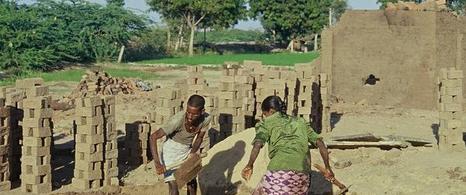Capacity development at intermediate and national level
Capacity development at intermediate and national level

The objective of capacity development for an enabling environment for MUS is to create skills, knowledge and attitude and organisational and institutional systems and structures at intermediate and nation level, to stimulate, facilitate and support the provision of multiple-use water services.
OBJECTIVE
The objective of capacity development for an enabling environment for MUS is to create skills, knowledge and attitude and organisational and institutional systems and structures at intermediate and nation level, to stimulate, facilitate and support the provision of multiple-use water services.
ACTIVITIES
PARTICIPATORY ACTION RESEARCH
Involving intermediate and national level stakeholders directly in research on potential and barriers for MUS enables them to build their capacity and will improve their level of knowledge, skills and attitude towards multiple-use water services. In addition, involving these stakeholders in action research can lead to the identification of organisational and institutional barriers for MUS, which they can subsequently address.
TRAINING OF INTERMEDIATE AND NATIONAL LEVEL STAKEHOLDERS
Through training of intermediate and national level stakeholders, the capacity of these stakeholders can be built, so they have the knowledge and skills to plan for and support multiple-use water services. This can include the following:
- Training of engineers on how to design multi-purpose infrastructure.
- Training of planners and implementers on how planning for MUS can improve water services.
- Training of policy makers (local and nation government) on institutional, organisational and financial arrangements that enable MUS, etc.
The training should as much as possible be context specific and ideally be based on the evidence-base developed in the previous step. Training can include lecturing and exercises, but also field work assignments, exposure visits and exchange visits.
APPLYING A LEARNING ALLIANCE APPROACH
Applying a Learning Alliance approach means bringing together stakeholders at key institutional levels (local / community level – intermediate level – national level), to share and learn and jointly find solutions to complex problems (Moriarty, et al., 2005), like how to ensure the provision of sustainable multiple-use water services. It is an approach that combines action research and capacity development. The establishment of platforms at key institutional levels is intended to break down communication and coordination barriers between stakeholders a certain level and between the levels. Facilitating a Learning Alliance approach can thus contribute to improving the institutional coordination and convergence between different sub sectors (irrigation, agriculture, irrigation, etc.) needed to enable MUS.
TOOLS
The following tool can be useful to support the activities within this phase:
